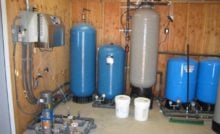Podcast Q&A 11: Why Use a Static Mixer for Chlorination Systems?


Podcast: Play in new window | Download
Subscribe: RSS
Hello. Welcome to the Clean Water Made Easy Podcast Question & Answer. This is Q&A Episode #11.
Each week, in our main podcast, I try to explore various well water treatment systems and specific applications or problems. I also like to do these quick Q&A episodes to answer some questions that we get. We receive hundreds of phone calls, emails, and chats daily through our website.
I try to pick an interesting one and answer it. In fact, we’ve received a chat message from Joanne, who asked, “What do static mixers do for chlorination systems? Can I use a static mixer in place of a contact tank?”
Thanks for your question.
When injecting chlorine into your water to cure specific problems, such as removing odors, killing bacteria, or oxidizing iron, you need to mix the chlorine into the water rapidly, and that’s what a static mixer does.
A static mixer looks like a piece of pipe. There are different sizes, but a common 1-inch one is about 14 inches long. If you could look inside it, you’d see a series of little pins or baffles inside it arranged in a specific way. As the water flows through, the chlorine or peroxide metering pump pumps a small amount of chlorine into the water.
The chlorine system pumps it into the pipe, and as the water enters the static mixer, it dissolves the chlorine very well into the water. It’s a thorough and rapid mixing. That’s what a static mixer does.
However, with chlorination, there’s this concept of you want to have a certain amount of concentration of chlorine, usually it’s somewhere between 1 and 5 parts per million, but it depends on how much iron, odor, manganese, or whatever you’re trying to correct. I have another episode that goes into detail about that- episode #8. In episode 8, I go over the chlorination systems. So there’s the idea of the concentration and then the time. That’s called the CT value. You have your concentration and time.
A static mixer will rapidly mix the chlorine into the water, but it doesn’t give you time. Depending on what you’re trying to do, you might need a contact tank. If you’re after disinfection, it’s better to use some contact tank to get time because the bacteria needs a little bit of time with the chlorination to be thoroughly killed and sanitized.
The best thing to do is to use both the static mixer and the contact tank. Say you’re injecting chlorine to kill odor and oxidize iron before an iron filter. Then, you only need about 10 to 30 seconds before the chlorinated water goes into the iron filter media. So, in that case, the static mixer is great. It’s just two different things: static mixer and contact tank.
A static mixer gives you a more rapid mixing time and more efficient transfer of the chemical into the water, so you get a better job and can, therefore, use fewer chemicals. The idea is that after you inject the chemical or peroxide, you don’t want any or very little left in the water, so the static mixer will help.
We often use them in combination with a contact tank to get mixing and time in order to achieve the results of what you’re trying to do –whether it’s to sanitize the water, kill the odors, or treat iron & manganese, whatever.
Do you have any questions and would like them answered? Just go to our website. There’s a chat box where you can chat with us and ask questions. You can also email us. My email is gerrybulfin@cleanwaterstore.com, or you can email support@cleanwaterstore.com.
Learn more about chlorination and CT values from the U.S. EPA:
EPA Disinfection Profiling and Benchmarking: Technical Guidance
I hope that helped, and I hope you folks have a nice day. Thank you.
Recent Posts
Water Quality for Horses and Livestock: A Guide to Healthier Barns and Pastures
Clean water is the cornerstone of animal health and productivity. Whether you're raising horses, cattle,…
Clean Drinking Water for Cats: What Every Cat Owner Should Know
Why Clean Drinking Water Matters for Cats Hydration is critical to a cat’s overall health,…
Pet Hydration: What to Know About Water Safety
Clean Drinking Water for Dogs: What Every Dog Owner Should Know Clean drinking water is…
How to Ensure Fresh, Safe Water for Your Birds: Daily Care Tips for Bird Owners
Why Filtered Water for Birds Is Essential for Their Health Like food, clean drinking water…
U.S. Water Problems by Region: Common Contaminants & Solutions
Curious about U.S. water problems by region? Water quality isn’t just a national issue—it’s a…
Wildfire Water Contamination: How to Ensure Safe Water After a Fire
Wildfire Water Contamination: What You Need to Know After the Fires Drinking water contamination is…

